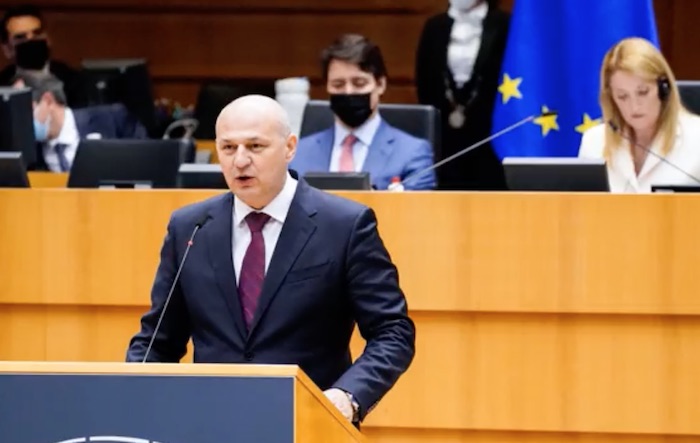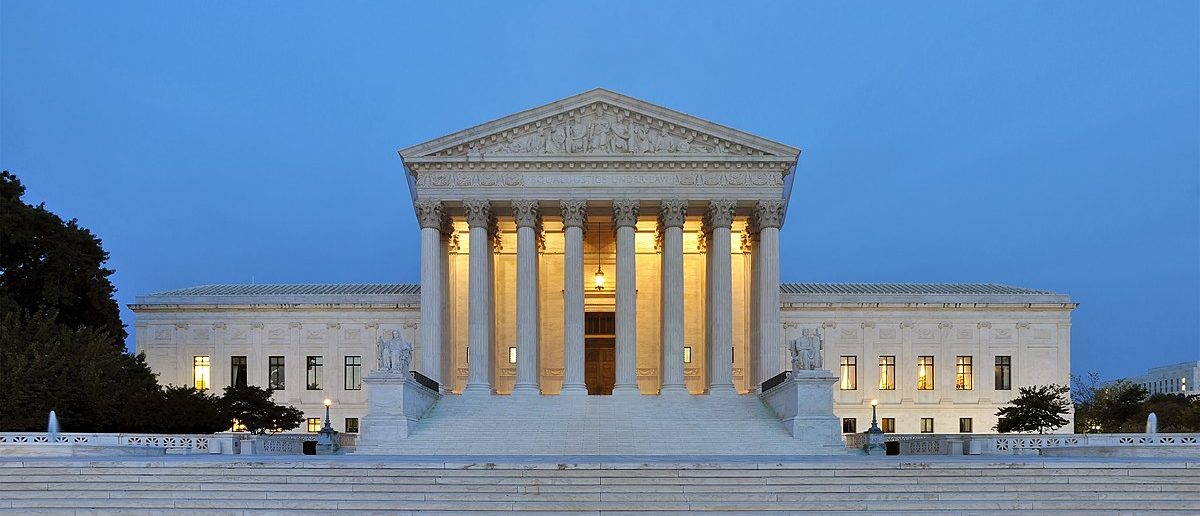International
Prime Minister Trudeau called ‘dictator’ to his face in blistering speech in European Parliament

It wasn’t the response Prime Minister Trudeau was hoping for. In fact in a career filled with humiliations on various international trips, Wednesday’s speech at the EU in Brussels has to be the worst experience of all for Canada’s PM.
As part of a longer speech in which Trudeau called on the EU for more support for Ukraine, Canada’s Prime Minister blamed the leaders of the Freedom Convoy for threatening democracy. That assertion did not go over very well.
Croatian MP Mislav Kolakusic responded by calling out Trudeau for violating the civil rights of Canadians participating in the Freedom Convoy protests. In a blistering speech to fellow EU Parliamentarians, Kolakusic turned to Trudeau and called his actions in crushing the Ottawa protest “dictatorship of the worst kind”. Trudeau sat quietly and listened as the MP from Croatia informed him many Europeans watched as he “trampled women with horses,” and blocked “the bank accounts of single parents.”
Click on the video below to see the humiliating tongue-lashing.
PM Trudeau, in recent months, under your quasi-liberal boot, Canada 🇨🇦 has become a symbol of civil rights violations. The methods we have witnessed may be liberal to you, but to many citizens around the🌎it seemed like a dictatorship of the worst kind. pic.twitter.com/FZuc6aDZ1I
— Mislav Kolakusic MEP 🇭🇷🇪🇺 (@mislavkolakusic) March 23, 2022
Kolakusic wasn’t the only European Union to express outrage with Prime Minister Trudeau today. Here’s German MEP Christine Anderson.
German MEP Christine Anderson to Justin Trudeau at European Parliament: "You are a disgrace to democracy. Please spare us your presence." https://t.co/rbs5IoKRbG
— Don Wilson, LLB 🇨🇦 (@DNSWilson) March 24, 2022
Meanwhile, Romanian MEP Christian Terhes outright refused to attend Trudeau’s speech. Probably a good thing for Trudeau judging by the tone of this social media post from Terhes today.
The following is from the Facebook page of Christian Terhes MEP from Romania.
Finally, thanks to Montreal based communicator Viva Frei for this compilation.
Daily Caller
Unanimous Supreme Court Ruling Inspires Hope For Future Energy Project Permitting


From the Daily Caller News Foundation
It comes as a surprise to many Americans when they learn that the vast majority of decisions issued by the U.S. Supreme Court are decided unanimously. Far too often, these unanimous decisions receive scant attention in the press due to their lack of controversy.
Such is the case with a key 8-0 decision the Court published May 29 that could help Congress and the Trump administration meet their goals to streamline permitting for energy projects in the United States. The decision narrows the scope of application of the National Environmental Policy Act (NEPA), a law whose environmental review provisions have been systematically used – and often abused – by climate alarm groups and plaintiff lawyers for decades to impede the progress of major projects of all kinds.
The case at hand involves the Uinta Basin Railway Project, which will transport oil produced in Utah’s Unita Basin and connect it to the national railway network so it can reach national markets. Because the rail line would parallel the Colorado River for roughly 100 miles, the D.C. Court of Appeals ruled in 2023 that the project’s developers would have to conduct a second, expanded environmental impact study under NEPA to try to assess nebulous potential impacts to air quality – often taking place thousands of miles away – or from a possible oil spill, rescinding a key permit that had been issued in 2021 by federal regulators.
Dear Readers:
As a nonprofit, we are dependent on the generosity of our readers.
Please consider making a small donation of any amount here.
Thank you!
It is key to note that that permit was issued by the federal Surface Transportation Board (STB) along with a 3,600-page environmental impact statement to comply with NEPA. In the conduct of the environmental review, the Wall Street Journal wrote that STB and the company assessed “the railway’s potential effects on local water resources, air quality, protected species, recreation, local economies, the Ute Indian tribe and much more.”
But for the plaintiffs and the D.C. Circuit Court, 3,600 pages of thorough scientific analysis just weren’t enough. They filed suit, complaining that the study didn’t try to assess potential impacts that might happen on dozens of other rail lines hundreds of miles distant, or, even more absurd, assess potential pollution in “environmental justice communities” as far away as the Texas and Louisiana Gulf Coast.
You really can’t make this stuff up.
If delay was the goal, the plaintiffs got a win, halting progress for four years. That is a sadly typical outcome for cases involving energy-related projects such as this one.
In their unanimous opinion written by Justice Brett Kavanaugh, the justices state, “The goal of the law is to inform agency decisionmaking, not to paralyze it.”
As I’ve written in previous stories, the vast majority of delays in permitting processes stem from provisions contained in major federal statutes designed to protect the environment and endangered species. In addition to NEPA, these laws include the Clean Air Act, the Clean Water Act and the Endangered Species Act. Among them all, none has been more broadly abused and misinterpreted by activist courts than NEPA.
In its analysis of the decision, the Institute for Energy Research says, in part, that the “decision means that agencies can approve projects like pipelines, railways, and dams and not be mandated to consider distant environmental effects of the projects, such as increased greenhouse gas emissions, that had stopped or delayed fossil fuel projects from moving forward, particularly during the Biden administration.” But, the author cautions, “the Uinta Basin Railway project could still face additional legal and regulatory hurdles within Colorado,” despite the ruling.
The good news is that even the liberal justices on the Supreme Court appear to be developing a growing awareness of just how absurd some of the claims made in lawsuits like this case really are. The unanimous nature of this decision inspires some sense of hope that the Trump administration can succeed in some of its efforts to reform the system and put an end to some of the most unjustified delays.
David Blackmon is an energy writer and consultant based in Texas. He spent 40 years in the oil and gas business, where he specialized in public policy and communications.
Business
RFK Jr. planning new restrictions on drug advertising: report

Quick Hit:
The Trump administration is reportedly weighing new restrictions on pharmaceutical ads—an effort long backed by Health Secretary Robert F. Kennedy Jr. Proposals include stricter disclosure rules and ending tax breaks.
Key Details:
-
Two key proposals under review: requiring longer side-effect disclosures in TV ads and removing pharma’s tax deduction for ad spending.
-
In 2024, drug companies spent $10.8 billion on direct-to-consumer ads, with AbbVie and Pfizer among the top spenders.
-
RFK Jr. and HHS officials say the goal is to restore “rigorous oversight” over drug promotions, though no final decision has been made.
Diving Deeper:
According to a Bloomberg report, the Trump administration is advancing plans to rein in direct-to-consumer pharmaceutical advertising—a practice legal only in the U.S. and New Zealand. Rather than banning the ads outright, which could lead to lawsuits, officials are eyeing legal and financial hurdles to limit their spread. These include mandating extended disclosures of side effects and ending tax deductions for ad spending—two measures that could severely limit ad volume, especially on TV.
Health and Human Services Secretary Robert F. Kennedy Jr., who has long called for tougher restrictions on drug marketing, is closely aligned with the effort. “We are exploring ways to restore more rigorous oversight and improve the quality of information presented to American consumers,” said HHS spokesman Andrew Nixon in a written statement. Kennedy himself told Sen. Josh Hawley in May that an announcement on tax policy changes could come “within the next few weeks.”
The ad market at stake is enormous. Drugmakers spent $10.8 billion last year promoting treatments directly to consumers, per data from MediaRadar. AbbVie led the pack, shelling out $2 billion—largely to market its anti-inflammatory drugs Skyrizi and Rinvoq, which alone earned the company over $5 billion in Q1 of 2025.
AbbVie’s chief commercial officer Jeff Stewart admitted during a May conference that new restrictions could force the company to “pivot,” possibly by shifting marketing toward disease awareness campaigns or digital platforms.
Pharma’s deep roots in broadcast advertising—making up 59% of its ad spend in 2024—suggest the impact could be dramatic. That shift would mark a reversal of policy changes made in 1997, when the FDA relaxed requirements for side-effect disclosures, opening the floodgates for modern TV drug commercials.
Supporters of stricter oversight argue that U.S. drug consumption is inflated because of these ads, while critics warn of economic consequences. Jim Potter of the Coalition for Healthcare Communication noted that reinstating tougher ad rules could make broadcast placements “impractical.” Harvard professor Meredith Rosenthal agreed, adding that while ads sometimes encourage patients to seek care, they can also push costly brand-name drugs over generics.
Beyond disclosure rules, the administration is considering changes to the tax code—specifically eliminating the industry’s ability to write off advertising as a business expense. This idea was floated during talks over Trump’s original tax reform but was ultimately dropped from the final bill.
-

 Alberta2 days ago
Alberta2 days agoAlberta health care blockbuster: Province eliminating AHS Health Zones in favour of local decision-making!
-

 Alberta1 day ago
Alberta1 day agoCentral Alberta MP resigns to give Conservative leader Pierre Poilievre a chance to regain a seat in Parliament
-

 Alberta1 day ago
Alberta1 day agoCalls for a new pipeline to the coast are only getting louder
-

 conflict2 days ago
conflict2 days agoTrump: ‘We’ have control over Iranian airspace; know where Khomeini is hiding
-

 Alberta1 day ago
Alberta1 day agoAlberta pro-life group says health officials admit many babies are left to die after failed abortions
-

 Daily Caller1 day ago
Daily Caller1 day ago‘Not Held Hostage Anymore’: Economist Explains How America Benefits If Trump Gets Oil And Gas Expansion
-

 Alberta17 hours ago
Alberta17 hours agoUnified message for Ottawa: Premier Danielle Smith and Premier Scott Moe call for change to federal policies
-

 Censorship Industrial Complex20 hours ago
Censorship Industrial Complex20 hours agoJordan Peterson reveals DEI ‘expert’ serving as his ‘re-education coach’ for opposing LGBT agenda

